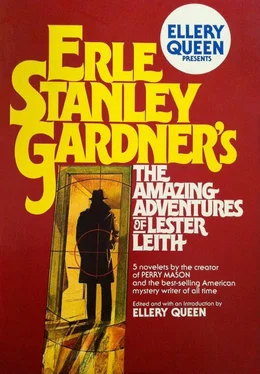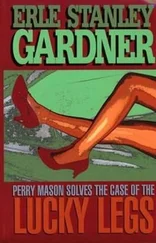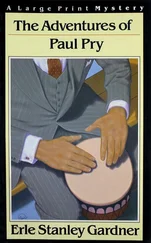“Yes, sir,” the spy said.
“And a very poor loser,” Leith remarked.
“I’ll say he’s a poor loser,” the spy blurted. “Any man who will take advantage of his official position as a superior to wriggle out of paying a debt—”
“Scuttle,” Lester Leith interrupted, “what the devil are you talking about?”
“Oh, another matter, sir. Something else which happened to be on my mind.”
Leith said: “Well, get it off your mind, Scuttle. Bring out that bottle of Scotch and a soda siphon. We’ll have a quiet drink. Just the two of us.”
Beaver had just finished with the drinks when a knock sounded at the door. “See who it is, Scuttle.”
Dixie Dormley and Harry Vare stood on the threshold.
Leith, on his feet, ushered them into the room, seated the actress, indicated a chair for Vare, and said: “Two more highballs, Scuttle.”
Vare said haltingly: “I’m sorry, Mr. Leith. The way the thing was put up to me, I couldn’t have done any differently.”
Leith dismissed the matter with a gesture.
Dixie Dormley said: “After you left, a Captain Carmichael came in. He seemed terribly upset, and was pretty angry at Sergeant Ackley. It seems that two of the people who had been standing there were friends of Captain Carmichael, and they telephoned in to him about the brutality of the police.”
Leith smiled. “Is that so,” he commented idly. “What happened?”
Dixie Dormley said: “Well, Sergeant Ackley had just let Lamont go — figured he didn’t have any case against him. Captain Carmichael listened to what Ackley had to report, and was furious. He issued an order to have Lamont picked up again, and a radio car got him within a dozen blocks of the police station.
“They brought him back and Carmichael went to work on him, and in no time had a confession out of him. It seems he’d agreed to open one of the steel shutters for some Hindu priests. They’d paid him for the job. Then he got the idea of doublecrossing them, opened the safe, lifted the ruby, and hid it.
“He had it with him tonight when he was arrested. He swore the plainclothesman must have taken it from his pocket when they were scuffling. The plainclothesman denied it, and then they thought of this man who had first grabbed Lamont.
“So then they figured he was the man they wanted, and it turned out the police had not only let him go, but given him a couple of courtesy cards. Well, you should have heard Captain Carmichael! Such language!”
Leith turned to Vare.
“There you are, Vare,” he said. “A complete education in the detection of crime by the case method. Just observe Sergeant Ackley, do the exact opposite of what he does, and you’re bound to be a success.”
And the police spy, resuming his mixing of the drinks, could be seen to nod, unconsciously but perceptibly.
The Hand Is Quicker Than the Eye
Lester Leith, sprawled in a chaise longue on the screened balcony of his apartment, read the newspaper account of the theft with considerable interest.
A few paces behind him, Edward H. Beaver, the police undercover man who had insinuated his way into Leith’s service as a valet, made a great show of dusting; but his beady eyes were riveted on the slender, well-knit figure of the man whom police considered the most brilliant crime technician of the decade.
The newspaper account was somewhat vague. The theft had taken place at the residence of Charles Sansone, the well-known authority on Asiatic history, who had recently returned from an extended trip in the Orient. The victim of the theft had been one Katiska Shogiro, a Japanese gentleman who owned a pearl necklace of immense value. The clasp of the necklace was of that peculiar bright yellow gold which characterizes Chinese workmanship, and while undoubtedly the necklace bore a resemblance to a priceless museum piece which had vanished from the storeroom of the Forbidden City, Shogiro smilingly explained that the resemblance was purely superficial.
Sansone, it seemed, was interested in the necklace. It had even been intimated that he contemplated its purchase. In any event, Katiska Shogiro had been invited to the highly cosmopolitan dinner party at which Frank Thoms, the big game hunter, Peter Grier, the explorer, and Silman Shore, the expert trapshooter, were also present. Because Charles Sansone’s secretary, Mah Foy, was Chinese, Sansone had tactfully given her a day and night off, although she usually supervised the details of his dinner parties, and was generally present in the capacity of hostess...
Beaver, the pseudo-valet, becoming more and more absorbed in watching the man upon whom he spied, slowed down his dusting operations until his hands barely moved.
Leith, looking up, said, “Something wrong, Scuttle?”
The valet resumed his duties with alacrity, replying, “No, sir.”
It had long been a matter of great irritation to him that Leith refused to address him by the name of Beaver, but habitually referred to him as “Scuttle,” a nickname bestowed because of a fancied resemblance in Leith’s mind to a reincarnated pirate. Now the valet concealed his irritation by seizing the opportunity to discuss the theft of the necklace. He knew from experience that if he could turn Leith’s razor-sharp mind to the problem of the theft, it was quite possible that Leith, with no more information than was given by the newspaper accounts, would spot the thief. Once that had been done, the spy knew that a series of baffling and seemingly unrelated incidents would then occur which would culminate in Leith urbanely walking off with the loot under such circumstances that the police would be just one jump behind. Later, one of Leith’s charities would be enhanced by the exact amount which Leith had received for the sale of the loot, less 20 per cent which the police shrewdly suspected was retained by Leith as the costs of collection.
Beaver lived in anticipation of the moment when Leith’s smooth-working mind would overlook a bet, and the police would not be that one jump behind. So far that had not happened. At times the police had been almost on Leith’s heels, but they had never quite caught up.
“A most baffling crime, sir,” the spy said.
“Baffling?” Leith asked.
“Yes, sir. The pearl necklace.”
“Oh, that,” Leith said. “I fail to see anything baffling about it, Scuttle. It’s a run-of-the-mill crime. I suppose it would seem baffling to the untrained mind because of the mystery which seems to surround the manner in which Shogiro acquired the necklace in the first place. However, that’s only background. The crime itself is quite simple.”
“Simple, sir!” the valet exclaimed.
“Exactly,” Leith said.
“Perhaps then,” the spy said, in his best wheedling technique, “you can tell me who committed it.”
Leith selected a cigarette and said quite calmly, “That’s true, Scuttle.”
“What’s true, sir?”
“Perhaps I could tell you the identity of the thief.”
“Yes, sir?” the spy asked eagerly.
Leith struck a match.
“I’m waiting, sir,” the valet said.
“A most commendable habit,” Leith said, “that of patience, Scuttle. I recommend it most highly. At times, I’ve noticed a tendency on your part to be impatient.”
“I beg your pardon, sir, but you said you were going to tell me the identity of the culprit.”
Leith said, “Oh, no, Scuttle. There you go, misunderstanding me again. You merely mentioned that perhaps I could tell you the identity of the thief, and I admitted that perhaps I could.”
The spy flushed, but he kept his voice under control. “Yes, sir. I appreciate the distinction. Thank you, sir.”
“Don’t mention it,” Leith said.
Читать дальше












